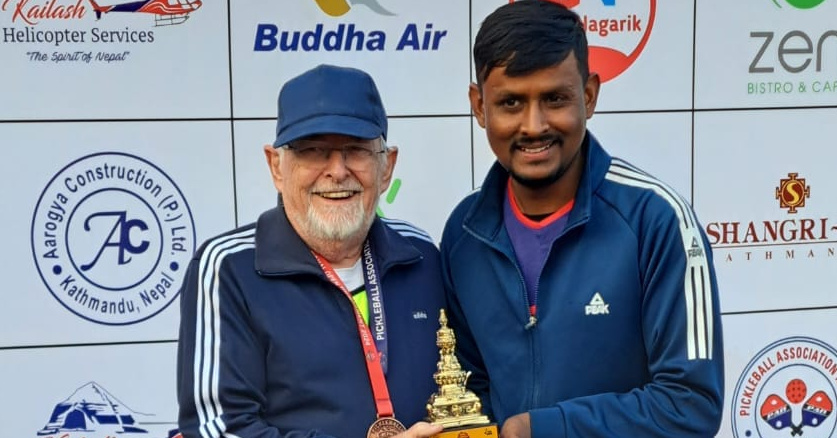Pickleball is going global — but not because of flashy marketing or big-money leagues. Instead, the sport is growing quietly and powerfully through the people who play it. And seniors? They’re right at the center of it all.
From sharing paddles with neighbors in new countries to leading community games on cruise ships, older adults are becoming unexpected ambassadors for the world’s fastest-growing sport. Whether traveling, retiring abroad, or simply introducing friends to the game, senior players are helping pickleball cross borders, break language barriers, and show up in places no one expected — including Antarctica.
How It Happens: The Organic Spread
The magic often starts with something simple: someone packing a paddle in their suitcase.
A U.S. retiree spends the winter in Portugal. A Canadian snowbird heads to Costa Rica. A Singaporean grandmother visits her children in Australia. They bring a paddle. Maybe a couple of balls. Maybe a second paddle, “just in case someone wants to try.”
One member of Senior Pickleball Tips is a medic in Gaza and has introduced the sport to local people there!
And then it happens — a neighbor asks what the game is. A passerby stops to watch. A local facility offers to tape down a temporary court. Soon there’s a small group playing a few times a week. Someone posts photos. A few more people join.
And just like that, pickleball takes root in a new place.
Pickleball as a Cultural Connector
Pickleball is incredibly accessible, and that’s a big reason why seniors have been successful in spreading it. You don’t need to speak the same language to play. The rules are simple, the rallies are short, and the vibe is casual.
That makes it a natural fit for cross-cultural connection. A player from the U.S. can step onto a court in India and be playing doubles with a local in minutes. A traveler in Nigeria might explain the game to someone at a community center and be setting up a net by that afternoon.
In this way, pickleball isn’t just growing — it’s creating new kinds of connection and community, led in large part by older adults who have the time, the experience, and the passion to share the game.
Seniors Teaching and Volunteering Abroad
Some senior players are taking it even further. They’re not just playing — they’re teaching.
Retired PE teachers, coaches, and longtime players are traveling to countries like Kenya, Thailand, or Brazil and offering free clinics to local schools and community groups. Others are donating paddles, balls, and nets to areas where sports equipment is expensive or hard to find.
Organizations like Pickleball Global and International Pickleball Teaching Professional Association (IPTPA) are supporting these efforts with training and structure — but many of these initiatives are still grassroots, often organized through personal networks or local expat communities.
For many seniors, it’s a meaningful way to combine travel, community service, and the joy of pickleball.
Government Support in Some Countries
In certain parts of the world, governments are starting to recognize what U.S. senior players have known for years: pickleball isn’t just fun — it’s good for public health.
Singapore and Malaysia are leading the way.
In Singapore, pickleball has been embraced as part of the government’s Active Ageing initiative. Community centers now host weekly sessions for older adults, with subsidized coaching and dedicated indoor courts. The Ministry of Health has supported research showing how pickleball helps improve balance, mental well-being, and social connection in seniors — and that’s translated into real investment.
Malaysia is following a similar path. Health and sports departments have promoted pickleball through public wellness programs, especially in urban areas like Kuala Lumpur and Johor Bahru. Seniors there are encouraged to join pickleball clubs, attend open play events, and use it as a low-impact way to stay active in retirement.
This top-down support, combined with enthusiastic grassroots players, has helped make Southeast Asia one of the fastest-growing regions for senior pickleball.
Creating Micro-Communities Abroad
Pickleball is also being used to create pockets of community for seniors living overseas.
- In Greece, expats and locals meet weekly on improvised village courts.
- In South Africa, retirement villages near Cape Town are starting to include pickleball lines on tennis courts.
- In Venezuela, a group of seniors in Caracas now plays in the mornings before the heat sets in, thanks to donated paddles from a former U.S. player who retired there.
- In Antarctica, yes — one Senior Pickleball Tips member regularly tapes lines on the floor at a U.S. research station and plays indoors with colleagues during their downtime. Talk about taking the game to the ends of the earth.
In each of these places, the presence of even one or two enthusiastic older players has sparked interest and, in some cases, small but sustainable communities.
Online Communities Helping Connect the Dots
Digital platforms are playing a key role, too. Facebook groups, WhatsApp chats, and pickleball forums are filled with seniors sharing travel tips, play locations, and inviting newcomers to international games.
Senior Pickleball Tips members, for example, have used the group to connect across borders — organizing meetups, sharing equipment suggestions, and offering support for players trying to grow the game in new areas. Even going on pickleball cruises together!
It’s informal, it’s welcoming, and it’s working.
Final Thoughts: The Unexpected Ambassadors
Who would have guessed that one of the biggest forces behind global pickleball would be retirees?
But it makes perfect sense. Seniors have the time, the perspective, and the generosity to share something that brings them joy. And pickleball — simple, social, and accessible — is the perfect vehicle for that.
So, whether you’re playing in your hometown, planning a trip to Singapore, or considering how to tape down a court in the Canary Islands, remember: you’re not just playing a game. You’re part of something much bigger — a quiet, joyful movement that’s connecting people across the world, one paddle at a time.
